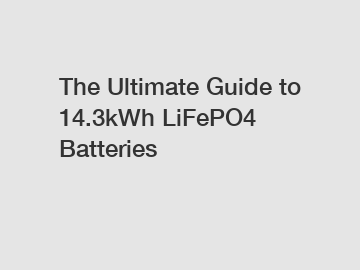The Ultimate Guide to 14.3kWh LiFePO4 Batteries
Are you looking for the ultimate guide to 14.3kWh LiFePO4 batteries? Look no further! In this comprehensive article, we will explore everything you need to know about these powerful and versatile batteries.
LiFePO4 batteries, also known as lithium iron phosphate batteries, are a type of rechargeable battery that has become increasingly popular in recent years. They are known for their high energy density, long cycle life, and excellent performance in various applications. The 14.3kWh capacity of these batteries makes them ideal for a wide range of uses, from residential solar energy storage to electric vehicles.
One of the key advantages of LiFePO4 batteries is their long cycle life. Unlike traditional lead-acid batteries, which typically only last a few hundred cycles, LiFePO4 batteries can last thousands of cycles with proper care and maintenance. This makes them a cost-effective and reliable choice for long-term energy storage solutions.

Another benefit of LiFePO4 batteries is their high energy density. This means that they can store a large amount of energy in a relatively small and lightweight package. The 14.3kWh capacity of these batteries makes them perfect for applications where space and weight are important considerations, such as off-grid solar systems or electric vehicles.
In addition to their long cycle life and high energy density, LiFePO4 batteries are also known for their safety and stability. Unlike other types of lithium-ion batteries, LiFePO4 batteries are much less prone to thermal runaway or other safety hazards. This makes them a reliable choice for critical applications where safety is a top priority.
When it comes to choosing the right 14.3kWh LiFePO4 battery for your needs, there are a few key factors to consider. The first is the voltage of the battery, which will determine how it can be used in your specific application. Most LiFePO4 batteries have a nominal voltage of 3.2V per cell, so a 14.3kWh battery pack would typically consist of multiple cells connected in series to achieve the desired voltage.
Another important factor to consider is the maximum discharge rate of the battery. This will determine how much power the battery can deliver at any given moment. For high-power applications such as electric vehicles, a battery with a high discharge rate may be necessary to meet the demands of the system.
It is also important to consider the depth of discharge (DOD) of the battery, which refers to the percentage of the total capacity that can be safely discharged before recharging is necessary. LiFePO4 batteries typically have a higher DOD compared to other types of lithium-ion batteries, which allows for more flexibility in how they are used.
Finally, it is important to consider the overall quality and reputation of the battery manufacturer. Look for companies that have a proven track record of producing high-quality batteries and providing excellent customer service. A reputable manufacturer will stand behind their products and offer warranties and support in case of any issues.
In conclusion, 14.3kWh LiFePO4 batteries are a powerful and versatile energy storage solution for a wide range of applications. Their long cycle life, high energy density, safety, and stability make them an excellent choice for residential solar energy storage, off-grid systems, electric vehicles, and more. When choosing a LiFePO4 battery, be sure to consider factors such as voltage, discharge rate, DOD, and manufacturer reputation to ensure you are getting a high-quality and reliable product for your needs.
For more information, please visit lifepo4 battery energy storage system supplier, 51.2v 304ah diy empty battery pack box supplier, what is c&i energy.

Comments
0